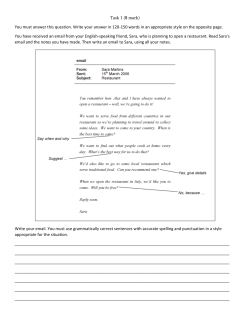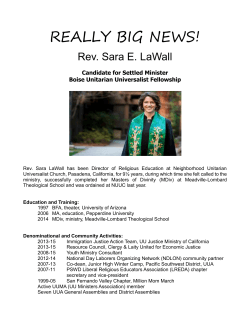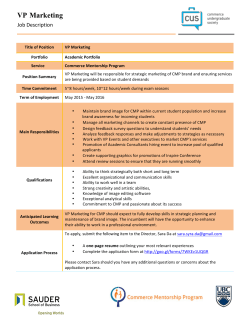
MEDIA RELEASE - nc-sara
NEBHE NCSARA MHEC WICHE MEDIA RELEASE www.nc-sara.org 3005 Center Green Drive, Suite 130, Boulder, CO 80301 SREB National Council for State Authorization Reciprocity Agreements A voluntary, regional approach to state oversight of distance education Contact: Lisa Greco NC-SARA Communications Coordinator lgreco@nc-sara.org p 303.541.0267 May 13, 2015 New Mexico, Vermont and Wyoming join SARA; National SARA board meets Boulder, Colorado – New Mexico and Wyoming have been approved by the Western Interstate Commission for Higher Education (WICHE) to become members of the WICHE State Authorization Reciprocity Agreement (W-SARA). In addition, Vermont has been approved by the New England Board of Higher Education (NEBHE) as the second state in the region to join the New England State Authorization Reciprocity Agreement (N-SARA). These states join 20 others (Alaska, Arizona, Colorado, Idaho, Indiana, Kansas, Louisiana, Minnesota, Missouri, Montana, Nebraska, Nevada, New Hampshire, North Dakota, Ohio, Oregon, South Dakota, Virginia, Washington and West Virginia) as members of SARA. SARA is a nationwide initiative of states that will make distance education courses more accessible to students across state lines and make it easier for states to regulate and institutions to participate in interstate distance education. The effort is funded by a $3 million grant from Lumina Foundation, $200,000 from the Bill & Melinda Gates Foundation, and fees paid by institutions. The New Mexico Higher Education Department will serve as the state “portal” agency for SARA and provides oversight of all “private postsecondary educational institutions” operating within the state of New Mexico, including academic, vocational, technical, business, professional, or other schools, colleges or universities, other organizations or persons offering courses, instruction, training or education from a physical site in New Mexico, through distance education, correspondence, or in person. The Department is now accepting institutional participation applications. The Vermont Agency of Education provides leadership, support and oversight to ensure that the Vermont public education system enables all students to have the knowledge and skills necessary for success in college, continuing education, careers and citizenship. The Agency works to achieve this goal within federal policy and intensifying public focus on cost effectiveness and accountability. The Agency will serve as the state “portal” agency for SARA and will begin accepting institutional participation applications in late fall 2015. The Wyoming Community College Commission (WCCC) will serve as the state “portal” agency for SARA. WCCC contributes to Wyoming’s quality of life through serving as a partner in the statewide community college system and adult education programs, thereby strengthening and enriching communities. The agency’s contribution to this partnership entails coordination, accountability, communication, reporting, leadership, oversight and support for the colleges and students of Wyoming. WCCC will begin accepting institutional participation applications mid-July 2015. On May 7, 2015, board members of the National Council for State Authorization Reciprocity Agreements (NC-SARA) gathered in Boston to review, discuss, and take actions affecting the initiative’s continued advancement. These 20 leaders from various sectors of higher education and government help guide the activities of SARA. At this meeting, the board gave approval to additions and modifications to the NC-SARA Policies and Standards. A proposed policy regarding the participation of Native American tribal colleges in SARA was added and states: Colleges otherwise eligible to participate in SARA that are chartered and/or controlled by federally recognized Indian tribal governments may participate in SARA by signing an agreement to do so with the appropriate SARA portal agency of the state where the principal campus of the college is located. A modification process for SARA Policies and Standards was also approved by the board. An amendment to the NC-SARA Policies and Standards was approved to provide clarification of how a SARA institution may be denied further participation. The board also made changes to the complaint resolution process to require state-to-state notice of appealed complaints. The board also took steps toward moving to 501(c)3 status for NC-SARA. Information items covered in the meeting included: liability insurance for members of NC-SARA; renewal process and form for SARA institutions; the first reporting of appealed complaints by SARA portal agencies; U.S. Department of Education actions affecting state authorization; and the NC-SARA staff work plan for FY 2016. FAQs added since the December NC-SARA board meeting regarding hybrid programs; aviation programs; and state authority to bill for costs of investigating institutions were also reviewed as well as the following upcoming FAQs: Must an institution offer distance education to participate in SARA?; Does SARA cover dual enrollment courses taken by high school students? As of May 12, 2015, SARA-enabling legislation has passed in an additional six states and four states have determined that no legislation is needed to enable participation in SARA. Background Information about SARA The SARA agreements are overseen by the National Council for State Authorization Reciprocity Agreements (NC-SARA) and are being implemented by the four regional higher education interstate compacts: the Midwestern Higher Education Compact (MHEC), the New England Board of Higher Education (NEBHE), the Southern Regional Education Board (SREB) and the Western Interstate Commission for Higher Education (WICHE). Once a state joins SARA, accredited degree-granting institutions in the state that offer distance education courses can seek approval from their state to participate in SARA. When approved, these institutions will be able to operate in other participating SARA states without seeking independent authorization from those states. Participating in SARA is entirely voluntary for institutions, as it is for states. The NC-SARA board is a nationwide coordinating entity that assures the four regional compacts establish uniform standards and procedures for accepting and monitoring states participating in each of their respective regional reciprocity agreements. The NC-SARA board includes the chief executive officers of the four regional compacts, four leaders from the National Commission and Presidents’ Forum/Council of State Governments efforts, and additional members to assure that the perspectives of all stakeholder groups will be represented. A list of members is available at: www.nc-sara.org/about/national-council About NC-SARA, MHEC, NEBHE, SREB, WICHE, and Lumina Foundation The National Council for State Authorization Reciprocity Agreements (NC-SARA) is a voluntary, regional approach to state oversight of postsecondary distance education. The initiative is administered by the country’s four regional higher education compacts (MHEC, NEBHE, SREB and WICHE) and overseen by NC-SARA. States and institutions that choose to participate agree to operate under common standards and procedures, providing a more uniform and less costly regulatory environment for institutions, more focused oversight responsibilities for states and better resolution of student complaints. www.nc-sara.org The Midwestern Higher Education Compact is a nonprofit regional organization assisting Midwestern states in advancing higher education through interstate cooperation and resource sharing. MHEC seeks to fill its interstate mission through programs that expand postsecondary opportunity and success; promote innovative approaches to improving institutional and system productivity; improve affordability to students and states; and enhance connectivity between higher education and the workplace. Member states are: Illinois, Indiana, Iowa, Kansas, Michigan, Minnesota, Missouri, Nebraska, North Dakota, Ohio, South Dakota and Wisconsin. www.mhec.org The New England Board of Higher Education promotes greater educational opportunities and services for the residents of New England. It works across six New England states to engage and assist leaders in the assessment, development, and implementation of sound education practices and policies of regional significance; promote policies, programs, and best practices to assist the states in implementing important regional higher education policies; promote regional cooperation and programs that encourage the efficient use and sharing of educational resources; and provide leadership to strengthen the relationship between higher education and the economic well-being of New England. www.nebhe.org The Southern Regional Education Board works with 16 member states to improve public education at every level, from pre-K through Ph.D. SREB is a nonprofit, nonpartisan organization headquartered in Atlanta. SREB states currently participate in SREB’s Electronic Campus Regional Reciprocity Agreement, and SREB is working closely with SARA to expand reciprocity nationwide. Member states are Alabama, Arkansas, Delaware, Florida, Georgia, Kentucky, Louisiana, Maryland, Mississippi, North Carolina, Oklahoma, South Carolina, Tennessee, Texas, Virginia and West Virginia. www.sreb.org The Western Interstate Commission for Higher Education and its 16 members work collaboratively to expand educational access and excellence for all citizens of the West. By promoting innovation, cooperation, resource sharing, and sound public policy among states and institutions, WICHE strengthens higher education’s contributions to the region’s social, economic and civic life. WICHE’s members include: Alaska, Arizona, California, Colorado, Hawai‘i, Idaho, Montana, Nevada, New Mexico, North Dakota, Oregon, South Dakota, Utah, Washington, Wyoming and the Commonwealth of the Northern Mariana. www.wiche.edu Lumina Foundation is an independent, private foundation committed to increasing the proportion of Americans with high-quality degrees, certificates and other credentials to 60 percent by 2025. Lumina’s outcomes-based approach focuses on helping to design and build an accessible, responsive and accountable higher education system while fostering a national sense of urgency for action to achieve Goal 2025. For more information logon to www.luminafoundation.org. w w w.nc-sara.org
© Copyright 2025










